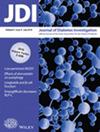Association of impaired fasting glucose with cardiometabolic multimorbidity: The Kailuan study
Abstract
Aims/Introduction
We investigated the association between impaired fasting glucose (IFG) and cardiometabolic multimorbidity (CMM) in the Chinese population.
Materials and Methods
We included 119,368 participants, free of diabetes mellitus and cardiovascular disease, who participated in the health examination (2006, 2008, 2010) of the Kailuan Study. According to World Health Organization diagnostic criteria, participants were divided into normal fasting blood glucose (FBG) (<6.1 mmol/L) and IFG (FBG 6.1–6.9 mmol/L) groups. CMM was defined as having two or more cardiometabolic diseases, including myocardial infarction, stroke and diabetes mellitus. We used Cox proportional hazards models to evaluate associations between IFG and CMM.
Results
During a median follow-up period of 13.94 years, 2,432 CMM incident events occurred. After adjusting potential confounders, the hazard ratio (HR) and 95% confidence interval (CI) for CMM in the IFG group was 2.83 (95% CI 2.58–3.10) versus the normal FBG group. The HR of IFG for diabetes mellitus was 3.43 (95% CI 3.30–3.55), which was >1.25 (95% CI 1.13–1.37) for myocardial infarction, 1.16 (95% CI 1.07–1.25) for ischemic stroke and 1.06 (95% CI 0.88–1.27) for hemorrhagic stroke. Compared with normal FBG, HRs for risk of IFG for CMM were 2.73 (95% CI 2.48–3.02) in men and 3.86 (95% CI 2.92–5.09) in women.
Conclusion
IFG was a risk factor for CMM. The effect of IFG on diabetes mellitus was stronger than that on other cardiometabolic diseases. The effects of IFG for CMM differed by sex.


 求助内容:
求助内容: 应助结果提醒方式:
应助结果提醒方式:


